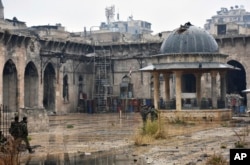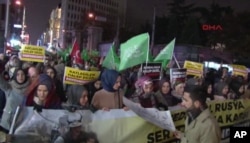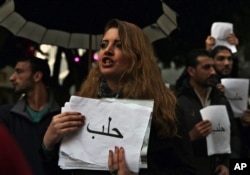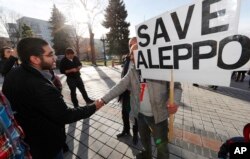Syria's Russia-backed government and rebels in Aleppo fighting to oust it announced Tuesday that the two sides had reached a deal to facilitate the withdrawal of opposition fighters and tens of thousands of civilians from the war-ravaged city.
The deal, brokered by Turkey and Russia, was announced ahead of an emergency meeting of the U.N. Security Council, and a short while after U.N. claims that government loyalists in Aleppo had executed scores of people as rebel defenses in the city withered.
Details of the deal were sketchy late Tuesday, with relocation sites for evacuated civilians and government concessions to rebel fighters unclear.
Russia's U.N. Ambassador Vitaly Churkin said most of the fleeing opposition fighters would move to Idlib, a city of 165,000 residents 60 kilometers southwest of Aleppo.
Churkin described the deal as the end of a "very difficult chapter" for Aleppo and said his government hoped it would lead to the "relaunching [of] political negotiations."
U.N. envoy voices caution
For his part, U.N. special envoy Staffan de Mistura described conditions Tuesday in eastern Aleppo as "very concerning," and he warned against assuming that the evacuation deal was in full force.
In comments to reporters in New York, he called for immediate U.N. access to eastern Aleppo to confirm the deal and to oversee the evacuation of civilians.
He also estimated that as many as 50,000 civilians remained late Tuesday in small pockets of eastern Aleppo, along with as many as 1,500 rebel fighters. Citing unconfirmed field reports, he said up to 30 percent of the remaining fighters had been identified as jihadists with links to al-Qaida and other extremist groups.
Separately, U.N. Secretary-General Ban Ki-moon told the 15-member Security Council that the world body stood ready to help implement a final deal.
"We remind all parties of their obligations under international humanitarian law to prioritize the safe passage of civilians out of eastern Aleppo and to ensure that those who have surrendered or been captured are treated humanely and in line with international law," Ban told council members.
Failed diplomacy
At the council session, Western envoys fiercely criticized Moscow for its ongoing military support of the government of President Bashar al-Assad and the months of atrocities inflicted on residents of the once-vibrant city.
"Are you truly incapable of shame? Is there literally nothing that can shame you?" U.S. Ambassador Samantha Power asked. "Is there no act of barbarism against civilians, no execution of a child that gets under your skin, that just creeps you out a little bit? Is there nothing you will not lie about or justify?"
Britain's envoy, Matthew Rycroft, echoed the words of Ban, saying the council had failed.
"It's failed because Russia has used and abused its veto time and again, even to prevent a seven-day cease-fire," Rycroft said.
For his part, Russian envoy Churkin dismissed Western accusations of widespread atrocities, calling them part of a "propaganda, disinformation and psychological" war.
He went on to equate the reports to the "spread of fake news," saying people fabricating such reports "stoop" to covering war zone children "with dust to be presented as victims of bombings."
Atrocities
Earlier, in Geneva, U.N. human rights spokesman Rupert Colville called on Syria to allow U.N. monitors or another organization such as the International Committee of the Red Cross immediate access to Aleppo.
"Civilians have paid a brutal price during this conflict, and we're filled with the deepest foreboding for those who remain in this last hellish corner of opposition-held eastern Aleppo," he said.
Separately, the ICRC warned Tuesday that thousands of civilians in eastern Aleppo "have literally nowhere safe to run," and it urged those involved in fighting there to protect them.
Once complete, the recapture of eastern Aleppo would end four years of fighting between a loose alliance of rebel factions and Assad's army, which is backed by Shi'ite Hezbollah fighters, Russian forces and Shi'ite militia supported by Iran.
A yearlong government offensive intensified in September, when Assad's forces were bolstered by Russian air power. Monitors described the Russian air war on Aleppo's eastern sector as methodical and said entire neighborhoods were flattened street by street under the onslaught.
Rebel commanders and opposition politicians insist the loss of Aleppo will not mark the end of the uprising.
However, few doubt battlefield fortunes have swung heavily against them, and with the regime possibly hours away from seizing what is left of insurgent-controlled eastern Aleppo, the dynamic of resistance will have to change to guerrilla warfare to keep the revolution alive.
VOA's Jamie Dettmer contributed to this report








